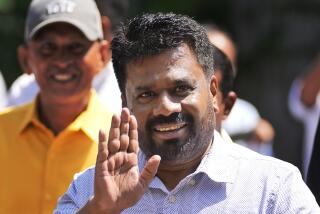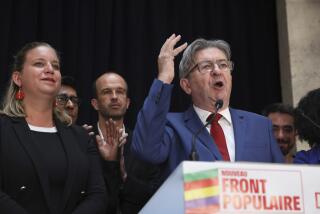Opposition Socialist Alliance Wins Plurality in Sri Lanka
- Share via
NEW DELHI — A socialist alliance that wants to try negotiating an end to Sri Lanka’s 11-year-old civil war emerged as the top vote-getter in the troubled island nation’s parliamentary election, official results showed Wednesday.
But even as happy backers of the People’s Alliance celebrated their victory by exploding firecrackers, the ruling United National Party was furiously trying to cobble together a coalition to safeguard its 17-year unbroken grip on power.
With the voters’ verdict now leaving no single party with a working legislative majority, whoever forms Sri Lanka’s new government will find it a “dicey affair,” predicted Gamini Wijesekara, United National Party general secretary.
In Tuesday’s vote, the leftist People’s Alliance won 105 seats to the ruling party’s 94, according to the tally issued by the election commissioner’s office. (The other 26 seats were captured by minority Hindu and Muslim parties.)
The balloting, in which an estimated 75% of Sri Lanka’s nearly 11 million voters took part, was a virtual referendum on President Dingiri Banda Wijetunga’s liberal economic policies, on the hard line he has taken toward the Tamil ethnic insurgency and on alleged widespread official corruption.
After the proclamation of the returns, Wijetunga is supposed to choose a new prime minister. But since neither his party nor the People’s Alliance won an outright 113-seat majority in the 225-member legislature, it was not clear Wednesday night what he would do.
“I appeal to all my countrymen to remain calm,” Wijetunga said in a televised address. “You may rest assured that I will be acting in terms of the constitution.”
The election followed the most violent political campaign in the Indian Ocean nation’s history. More than 3,000 street clashes were reported in the monthlong run-up to election day, and at least 20 people, most of them allied with the opposition, were slain.
On Tuesday, Tamil guerrillas, who called for a voter boycott, blew up a navy ship in northern Sri Lanka, killing two sailors. But otherwise, the insurgents--who are fighting for a separate Tamil homeland in Sri Lanka’s north and east--did not try to disrupt the election.
To prevent any unrest, Wijetunga declared a state of emergency immediately after the polls closed. On Wednesday, he extended a round-the-clock curfew until Friday, and soldiers patrolled the nearly empty streets of the capital, Colombo.
Scrambling to stay in power, the United National Party on Wednesday night was reportedly trying to entice the Sri Lanka Muslim Congress, a People’s Alliance ally that won seven parliamentary seats for itself, into a coalition by offering it three Cabinet positions. Sources in the ruling party confidently predicted they could win over the Muslim group, as well as three Tamil parties that won a total of 17 seats.
Meanwhile, the five-party People’s Alliance also started wooing the small minority parties to forge a majority in Parliament. Vehicles were sent to the north and east of the island to bring the leaders of the Tamil groups to Colombo for negotiations, one alliance source said.
The opposition alliance--led by the Sri Lanka Freedom Party, which ruled the island from 1970 to 1977--campaigned for an end to what it termed widespread government graft and corruption. It also pledged to negotiate with the Liberation Tigers of Tamil Eelam rebels.
Wijetunga took power in May, 1993, after strongman President Ranasinghe Premadasa was blown up by a suicide bomber believed to be a Tamil rebel. Although far from being as highhanded as his predecessor, Wijetunga has flatly refused to consider negotiations with the insurgents, saying the problem is not one of ethnic discontent but of terrorism.
More to Read
Sign up for Essential California
The most important California stories and recommendations in your inbox every morning.
You may occasionally receive promotional content from the Los Angeles Times.













